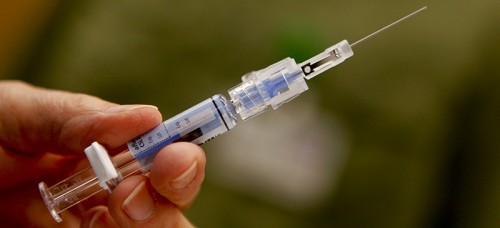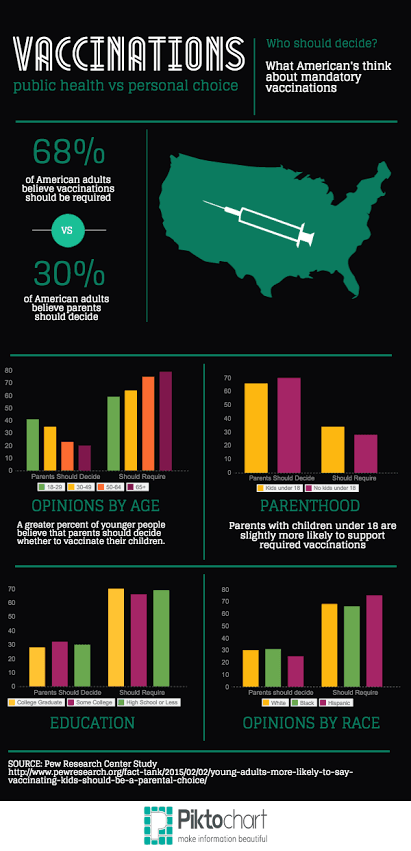
Following an outbreak traced to Disneyland by the Center for Disease Control, the highly infectious measles came roaring back to life in the United States with the opening of 2015.
The re-emergence of a disease that was eradicated from U.S. soil in 2000 has also ignited a fierce debate over the nature of vaccines: Should their usage be mandated as a public health concern, or do American citizens have the right to choose?
Small outbreaks of measles have not been uncommon in the past decade. In these cases, officials have cited foreign travel of unvaccinated or vulnerable individuals as the root cause, and the number of cases has hovered well below 200 annually, according to the CDC.
That is, of course, until recently. In 2011, the number of cases jumped to 222. In 2014, measles had its best year since its eradication with 644 cases reported.
Even with 2014 in hindsight, 2015 is already on track to feature an even larger outbreak. The official count is now at 121 cases stretched across 17 states, according to the CDC. Consequently, much of the nation has directed blame towards Disneyland’s home state of California.
The Golden State has one of the most lenient vaccination exemption policies in the country. Thousands of children in kindergarten are able to attend without proper vaccinations. More than 1,500 of the state’s daycares boast immunization rates at or lower than 92 percent, according to the Los Angeles Times. Experts believe that 92 percent is the lowest percentage of public immunization that can effectively prevent a large-scale measles outbreak.
In addition, the New York Times reported that in Orange County, California, some schools have less than 60 percent of their kindergarteners fully vaccinated. Other schools reported 20 to 40 percent of parents filed for an exemption for vaccination requirements, citing personal beliefs.
The Anti-Vaccination Movement, as it has become known, finds its roots in a paper published in 1998 by Lancet, a prestigious medical magazine. It proclaimed a link between the MMR (Measles, Mumps, Rubella) vaccine and autism. Naturally, the public became petrified as the media went into a frenzy.
However, in the years that followed, countless studies found no connection between the vaccine and any serious health problems. The author was eventually labeled a fraud by the greater medical community, lost his medical license and the paper was denounced as “utterly false” by Lancet’s editor in 2010 when the paper was fully retracted.

Still, the fear felt in 1998 lives on. The “anti-vaxxers,” as pundits have taken to calling them, have received much of the blame for the pervasiveness of the most recent outbreak. The demographics of those infected highlight the impact that the movement continues to have in California: According to the LA Times, almost 60 percent of those infected are over the age of 20, despite measles being commonly known as a childhood disease.
Measles has always been of particular concern to children. This is especially true for infants, who cannot receive the vaccine until they turn one year old, putting them at substantial risk. This stresses the importance of vaccination as a public health concern. More than protecting oneself from disease, vaccinating a community of healthy individuals protects those who are vulnerable. This effect has been coined by scientists as “herd immunization” or “herd protection.”
Despite that, and despite an astronomically huge body of scientific evidence supporting the safety and cumulative public good of vaccinations, fear still exists in California and in the anti- vaccination movement. The fear has been led, funneled and fueled by figures such as Jenny McCarthy and Rush Limbaugh, who have advocated strongly for the American citizen’s right to choose. Even the Internet isn’t without blame, according to visiting associate public health professor Suzanne Carlberg-Racich of DePaul University.
“The internet is so fabulous and awful at the same time,” Carlberg-Racich said, “because you can always find information … that supports your fear. There are people that can validate any fear who appear to have credentials or some level of notoriety,” referring specifically to Mrs. McCarthy, whose son is autistic.
In the past few weeks, commentators and columnists have weighed in heavily on the vaccination debate. Many of them have asked why there exists a debate in the first place, but others have vexed over the impossible question: how do you argue with someone on a scientific topic who rejects scientific knowledge?
Again, fear plays its timeless part. According to Carlberg-Racich, the response to such a deeply rooted fear can never be admonishment.
“I don’t think we get anywhere by judging people,” she said, saying that, while the anger at anti-vaccine parents may be justified, “Judging people with that fear is not going to make them go along with anything — it’s just going to make them dig in their heels.”
The question becomes, according to Carlberg-Racich, “How do you have an open and collaborative conversation with someone where they are allowed to express their fears, raise questions, consider the evidence and the impact of their decision on the community at large?”
“There’s a way to do that,” she said. “It takes listening to people, and trying as best you can to process all of the things involved in that decision and all of its effects.”